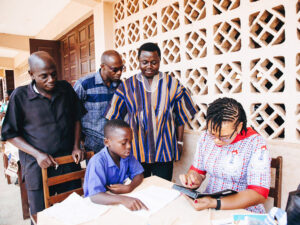
About 750,000 primary two pupils across the country are writing the 2022 edition of the National Standardised Test (NST).
A total of 18,000 public and private schools are participating in the test, being administered by 9000 Test Administrators, selected by the National Council for Curriculum and Assessment (NaCCA) of Ghana, in collaboration with the Education Ministry.
The Deputy Minister for Education Rev. John Ntim Fordjour, speaking to the media after monitoring some selected test centres in the Greater Accra region on Monday said the essence of the test is to ascertain the strength and weaknesses of the pupil in literacy and numeracy, which are the foundational skills that are required for learning for effective teaching and learning.
Some of the schools visited were the Pennywise International School and La-Presbyterian Basic schools in Accra.
Remedial measures
Rev. Ntim Fordjour stated that the test was part of the effort to ensure that fundamental weaknesses in education are addressed, explaining that after the exercise, feedback would be analysed on what to do, the intervention to deploy to which school, district, the region would what kind of support so that the right resources would be made available for it.
He was quick to mention that the test was not meant to test not to know which school is the best, best student or to ascertain the best teacher but to look for the right data on the true state of affairs so the right interventions would be put in place.
The Deputy Minister was full of praise to Dr Yaw Osei Adutwum for introducing the initiative to ascertain the proficiency level of pupils in numeracy and numeracy, so as to plan what kind of assistance they could be offered as they move on in their education at the primary level.
Rev. Ntim Fordjour, who is also the Member of Parliament for Assin South, in the Central region, indicated that the government through the Education Ministry and other Agencies have rolled out several interventions in the education sector and the test would help find out if the interventions have made any positive impact or not.
Commendation
The Deputy Minister eulogised the leadership of NaCCA and other Agencies, Head teachers of participating schools, Test Administrators and others who are doing everything possible to ensure that the exercise went on smoothly.
He recounted how in the past a child is only tested after writing the Basic Examination Certificate Examination (BECE) which is the only major test but stated that after the test a quick intervention package based on the weaknesses and strengths would be put in place to correct the challenges identified by the test.
Rev. Ntim Fordjour posited that the outcome of the test would help students to be assisted well before preparing to write BECE since weaknesses would be assisted with the right mitigation measures to ensure that the children get the right knowledge and skills needed before completing his/her Junior High School education.
He was upbeat that the test would help the foundation of children’s education to be strong so they could build on such foundations as they moved on with their education pursued.
Background
The Education Ministry in its bid to help find solutions to challenges confronting the education sector piloted the National Standardised Test in the country last year.
Last year’s edition saw pupils from all four primary pupils from public schools across the country taking part in the test.
The data gathered from the test assisted the government in planning and also finding the state of affairs at that level of education in the country. This year, the Education Ministry created an opportunity for all private schools in the country to hook up to the exercise but some of them could not submit the needed input towards the test leading to a few private schools being unable to participate in the test.
By Felix Baidoo








